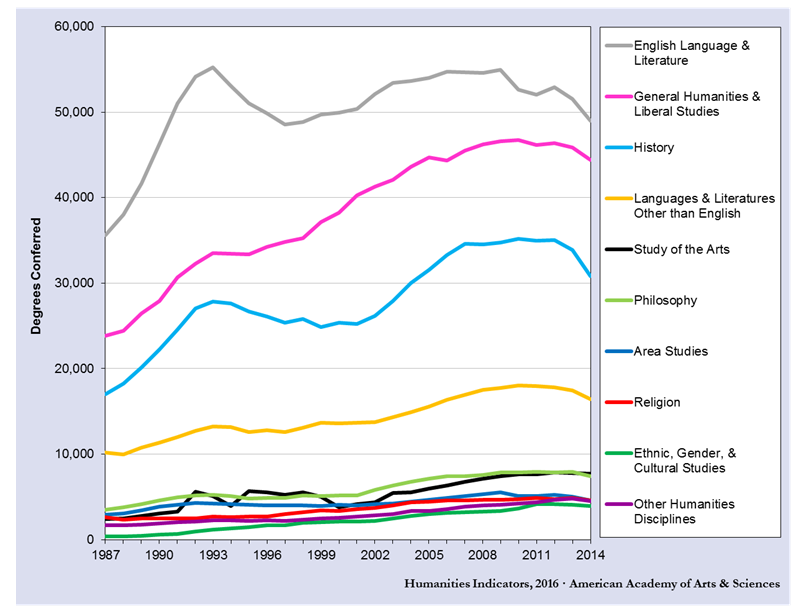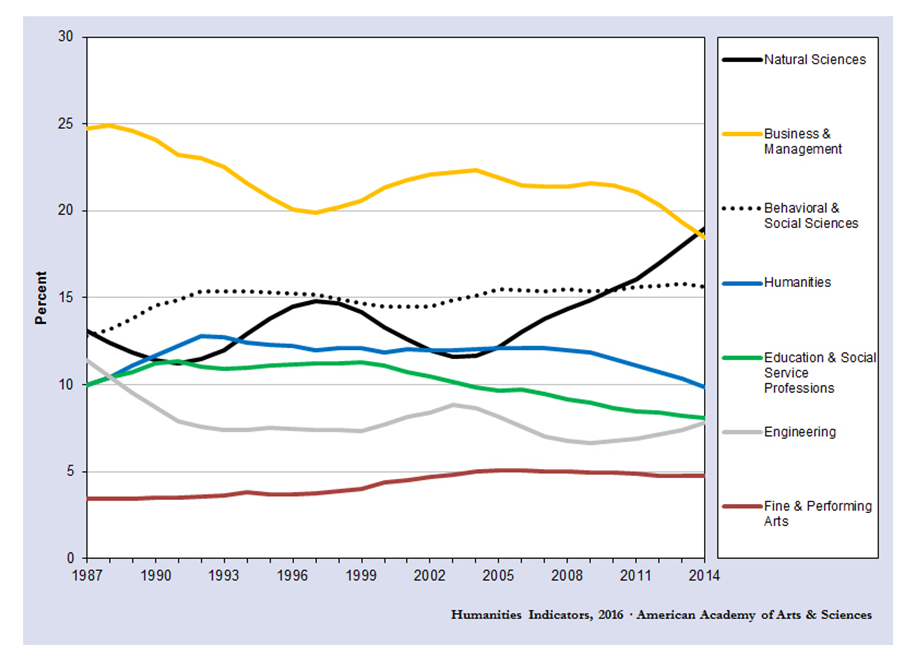You have /5 articles left.
Sign up for a free account or log in.

iStock
To listen to many politicians, one would think talented science students are abandoning laboratories to study the humanities. In fact, it is the humanities that are losing undergraduate majors, and a new analysis from the American Academy of Arts & Sciences documents the trend.
The number of bachelor’s degrees conferred in what the academy considers core humanities disciplines (English language and literature, history, languages and literatures other than English, linguistics, classical studies, and philosophy) declined 8.7 percent from 2012 to 2014, falling to the smallest number of degrees conferred since 2003 -- 106,869. Long-term declines in humanities majors (as a share of all undergraduates) have been well documented and are due in part to trends that even humanities scholars applaud, such as the opening up of science and technology fields to women. But these data are from recent years.
The data are part of the academy's Humanities Indicators project, which seeks to provide current information on the disciplines.
As a percentage of all bachelor’s degrees, the core disciplines in the humanities disciplines fell in 2014 to their lowest recorded level, 6.1 percent, in all years going back to 1948, the period for which the academy has reliable numbers. As recently as the early 1990s (well after STEM fields were open to women and many preprofessional programs grew), the equivalent figure was 8 percent. The highest level ever was 17.2 percent in 1967.
The academy also analyzed the data using a broader definition of the humanities -- including area and gender studies, some art study, and nonvocational religious studies -- used in the federal Classification of Instructional Programs. With this analysis, the share of bachelor's degrees awarded in the humanities is higher -- 9.9 percent -- but still the lowest recorded level ever. As illustrated in the chart that follows, which uses the broader definitions of humanities fields, the big winner in recent years has been the natural sciences. Business has also seen serious declines.
Shifts in Bachelor's Degrees Awarded, by Discipline
The drops in the last two years that the academy analyzed were not identical for all humanities disciplines, but the majors that attract the most students, English and history, fell by 8 percent and 12 percent, respectively. The largest percentage drops were in in archaeology and classical studies -- both down by 19 percent. Several relatively small (in numbers) humanities disciplines saw gains -- linguistics, comparative literature and folklore.
Shifts Within Humanities Majors

Trends in the number of majors are important to many scholars both because they value their fields and because college administrators cite low numbers of majors as reasons to shrink or eliminate programs. The latter trend is opposed by many humanities scholars, who say that type of analysis ignores their fields' centrality to general education.
Many note a societal focus on immediate payoff in postgraduation salaries (also something that humanities professors dispute, noting that their graduates do well, especially over time).
The reasons for recent declines have also been heatedly debated -- with many professors arguing that decisions by colleges, not declining student interest, are limiting humanities majors.
For example, some note that colleges have changed general education requirements, allowing many more students to avoid any exposure to the humanities, when for years a single required course may have been what inspired someone to major in a humanities field. At some colleges and universities, professors say that admissions policies have favored prospective science majors over prospective humanities majors.
Robert B. Townsend, director of the Washington office of the American Academy of Arts & Sciences, said the new data will likely "confirm some of the alarms we have been hearing from faculty and chairs about declining majors in their departments." Townsend said that many departments "are already quite concerned, so these numbers will only show that their experience is not an isolated phenomenon."
Humanities Gains at Community Colleges
New data released by the academy about community colleges may be more encouraging to humanities professors.
The number of associate degrees awarded in humanities fields increased from 338,688 in 2013 to 347,735 in 2014. One caveat is that many of those degrees were awarded in broad fields such as liberal arts and liberal studies that may have had strong social science components. Data from the academy show that community colleges have had slow but steady gains in degrees awarded in these broad fields.
In many cases these are the pretransfer degrees awarded to those who plan to seek bachelor's degrees after graduation.
Graduate Trends
The academy's new data show that doctoral degrees in the humanities were steady from 2012 to 2014, but that master's degrees fell by 6.7 percent. In many cases, since many graduate students earn master's degrees before their Ph.D.s, the master's figure may be reflected in Ph.D. data in future years.
Within the humanities there is debate over whether doctoral programs are admitting too many students, given the poor job market in academe that new Ph.D.s face. (Consider, for example, recent data on English and foreign languages and on history). Many advocates for the humanities say that colleges in fact need more Ph.D.s, but are just not hiring them, and that nonacademic careers provide important alternatives to academe for many Ph.D.s. Others argue that those with Ph.D.s would have better job chances without as many other new Ph.D.s entering the market.
Many rely on the Survey of Earned Doctorates, sponsored by the National Science Foundation, for trends in doctoral education, and that survey is next due out in December.









